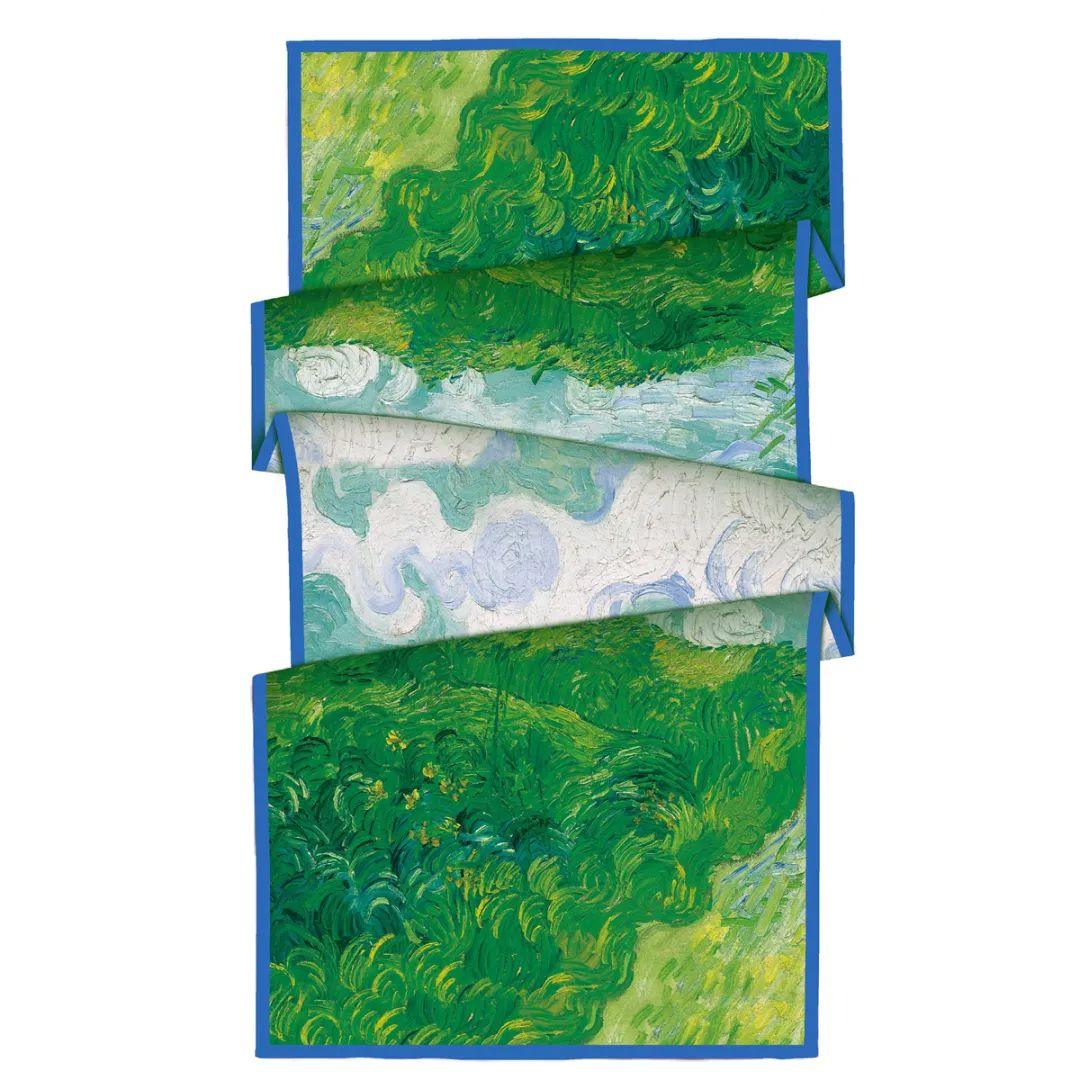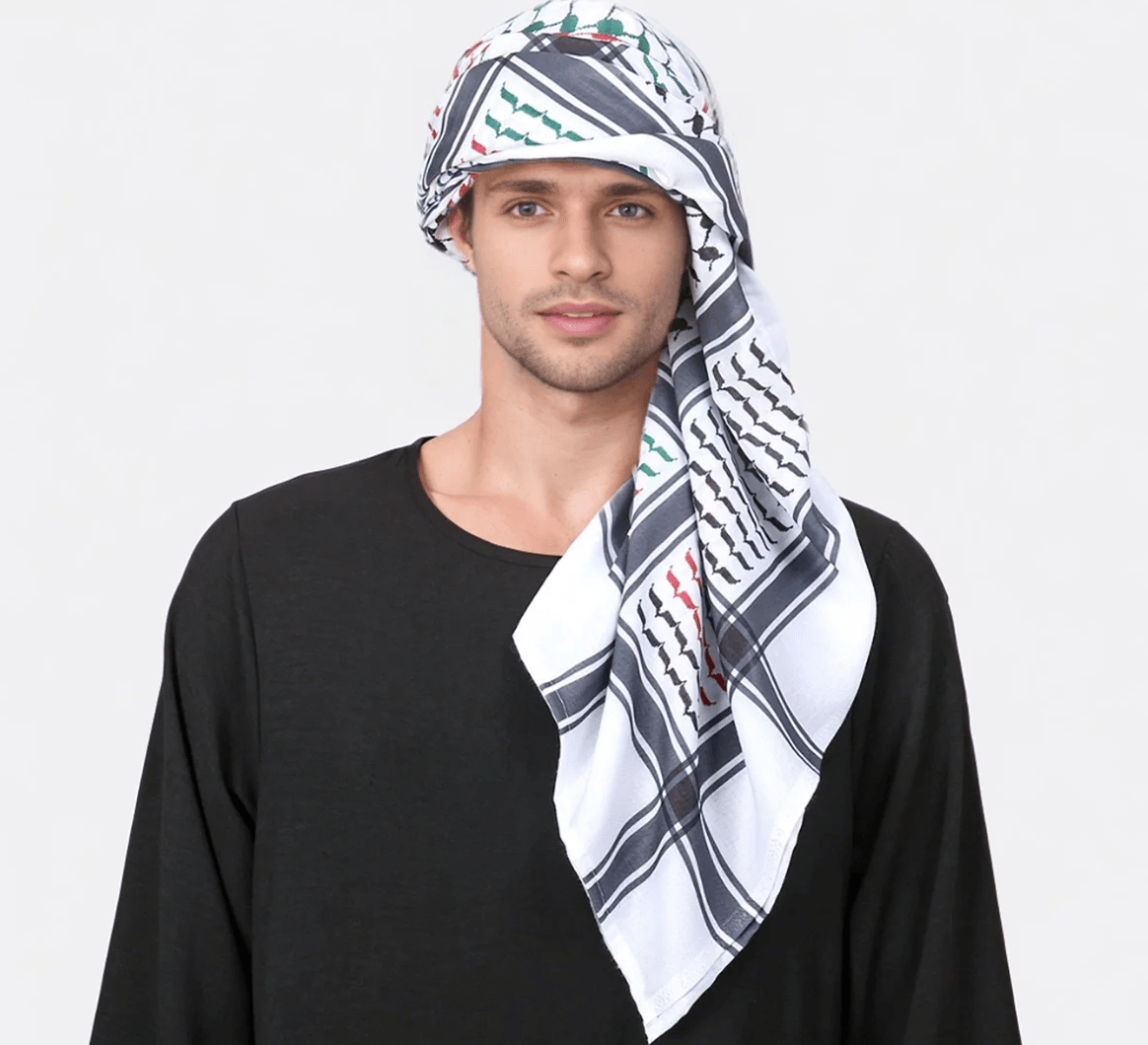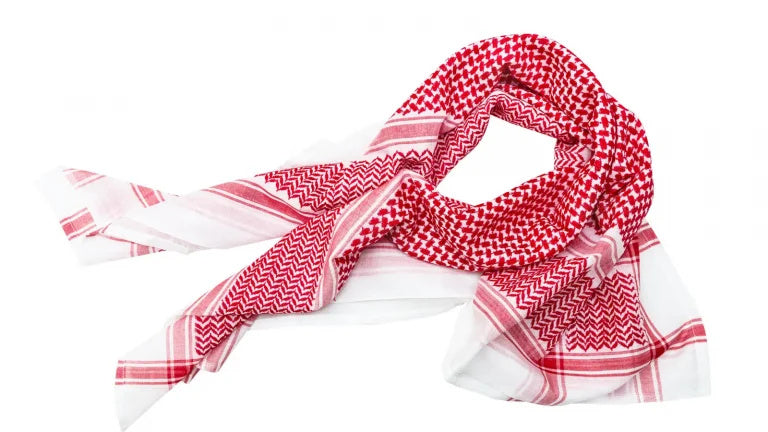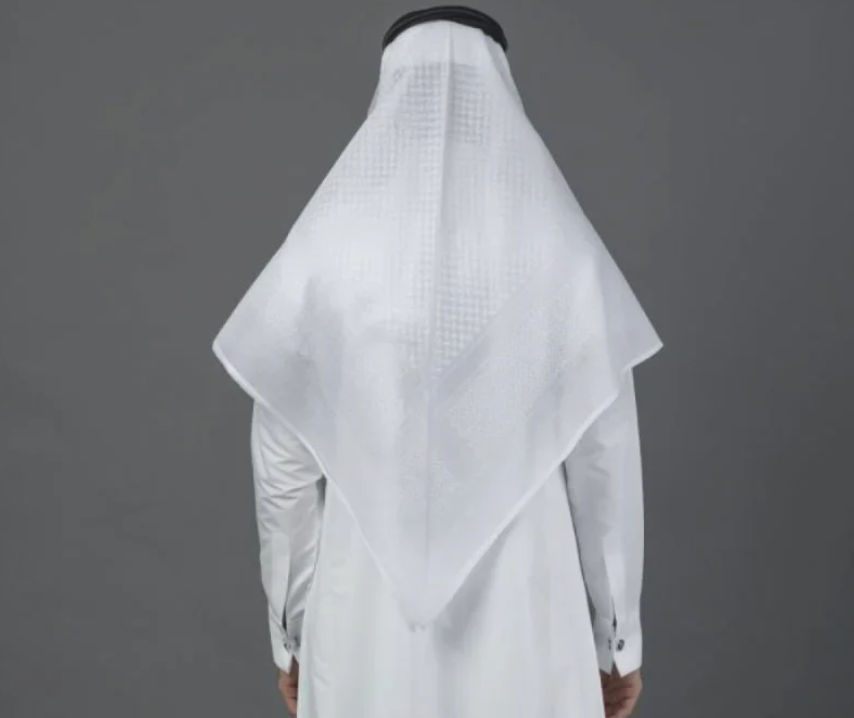





- Description
- Shipping
- Reviews
Yasser Arafat and the Keffiyeh: Symbols of the Palestinian Struggle
Product Description:
- Polyester 100%
- Jacquard
- 125cm x 125cm ( 49.2"W x 49.2"L )
The keffiyeh, a traditional headscarf worn by Palestinians, has come to symbolize the struggle for national identity and liberation. This garment, with its distinctive pattern and foldable design, has a rich history intertwined with the aspirations and resilience of the Palestinian people. One figure who played a pivotal role in popularizing the keffiyeh and linking it to the Palestinian cause was Yasser Arafat, the late leader of the Palestinian Liberation Organisation (PLO).
Originally worn by rural workers and Bedouins in Palestine for practical purposes—to protect against the harsh elements of summer heat and winter cold—the keffiyeh's significance evolved over time. Its breathability, afforded by air pockets created by folds in the fabric, made it a practical choice for those working in the fields. However, it was not until the early 20th century that the keffiyeh began to be associated with Palestinian nationalism.
During the Arab Revolt against British colonial rule in 1936, Palestinian nationalists used the keffiyeh as a means of disguising their identities and avoiding arrest. This marked a pivotal moment in Palestinian culture, as people from all social classes united around wearing the keffiyeh, making it difficult for the British authorities to identify the revolutionaries. The scarf thus became a symbol of solidarity and resistance against foreign occupation.
Yasser Arafat, who led the PLO from 1969 until his death in 2004, played a crucial role in popularizing the keffiyeh among a global audience. Arafat was never seen at any public event without his keffiyeh, which he wore with the longer end of the fabric carefully placed over his right shoulder. Some even say that the positioning of his keffiyeh resembled a map of pre-1948 Palestine, further embedding the garment with symbolic meaning.
Arafat's adoption of the keffiyeh as a personal and political symbol helped to elevate its status within the Palestinian community and beyond. The scarf became not just a practical item of clothing but a powerful emblem of Palestinian identity and resistance. During the period when the Israeli occupation authorities banned the Palestinian flag from 1967 until the Oslo Accords in 1993, the keffiyeh served as an everyday, portable, and visible expression of Palestinian nationality.
The keffiyeh's significance as a symbol of the Palestinian struggle was further reinforced by its association with cultural continuity and resilience. As Palestinians faced increasing threats to their collective identity and right to the land, they sought to hold onto items that represented their cultural heritage. The keffiyeh, with its roots in rural Palestine and its adoption by nationalists during key moments of resistance, became a shorthand for the Palestinian struggle.
In conclusion, Yasser Arafat's embrace of the keffiyeh helped to transform this traditional headscarf into a powerful symbol of the Palestinian cause. Through his leadership and his personal attachment to the garment, Arafat contributed to the keffiyeh's enduring legacy as a representation of Palestinian identity, resistance, and cultural continuity. Today, the keffiyeh remains an iconic emblem of the Palestinian struggle, worn by people around the world as a sign of solidarity with the Palestinian people.





At https://womanscarf.com/(the “Site”), we want to ensure you receive your orders in a timely and efficient manner. This Shipping and Taxes Policy describes our shipping and delivery process, as well as our tax collection practices.
- Processing Time
Most orders received before 5:00 p.m. Eastern Time, Monday through Friday, are shipped within 5 working days! Orders placed on Saturdays, Sundays, or holidays will be processed the next business day. As a security precaution, initial orders and orders shipping to alternate addresses may be held for extended verification. We reserve the right to make partial shipments, which will not relieve you of your obligation to pay for the remaining deliveries.
- Shipping Options and Charges
We offer various shipping options for your convenience, including standard, expedited, and international shipping. Shipping charges will be calculated based on the shipping option selected and the destination address. Shipping charges will be shown on your order form before you submit your order.
- Order Tracking
Once your order has shipped, we will provide you with a tracking number so you can track your package online. You will also receive email updates on the status of your order and estimated delivery date.
- Delivery Issues
If you experience any issues with the delivery of your order, please contact us immediately. We will work with our shipping carrier to resolve any issues and ensure your order is delivered as quickly as possible.
- Shipping Restrictions
We currently do not ship to certain countries or regions. Please check our website for the most up-to-date list of shipping restrictions.
- Taxes
A separate charge for taxes will be shown on the invoice. We are required to collect sales tax of 12.5% on all orders shipped to all Indian states. This tax is included in the prices displayed on our website.
- Title and Risk of Loss
All items purchased from our website are made pursuant to a shipment contract. This means that the risk of loss and title for such items passes to you upon our delivery to the carrier.
For more information on our shipping policies, including rates, delivery times, and delays, please refer to our Online Customer Service page or call us at 18058801462
Please note that this sample Shipping and Taxes Policy is for informational purposes only and is not a substitute for legal advice. You should consult with a qualified attorney to ensure your Shipping and Taxes Policy complies with applicable laws and regulations.

Fabric selection:
High-quality pure cotton yarns or cotton blends are usually selected to ensure comfort, breathability and durability.
In some seasons, wool or other natural fibers may be used to increase warmth retention.

Weaving process:
Jacquard technology: Use a jacquard loom to achieve complex pattern weaving by controlling the rise and fall of each warp. This is especially important for the geometric patterns and symbols commonly found on Arabic scarf.

Quality inspection and packaging:
Carry out final quality inspection and packaging of the finished to ensure that each product is up to standard and free of chromatic aberrations, broken wires or pattern errors.
You may also like
-
“Arrested, Shot, Still Fighting to Make America Great Again.” --Trump
Regular price $10.00 USDSale price $10.00 USDUnit price per
Regular price -
"London Charm · Eiffel Tower Flower Scarf" - Sunburn & Sheepskin
Regular price $14.28 USDSale price $14.28 USDUnit price per
Regular price$17.14 USDSale -
"Starry Night Dream: Van Gogh Art Inspired Scarf" --- Starlight Blue & Evening Blue
Regular price $7.19 USDSale price $7.19 USDUnit price per
Regular price$8.89 USDSale -
2024 Paris Olympic Lavender Flower Print Shawl Scarf --Lilac & Lavender Fog
Regular price $7.19 USDSale price $7.19 USDUnit price per
Regular price$8.59 USDSale














